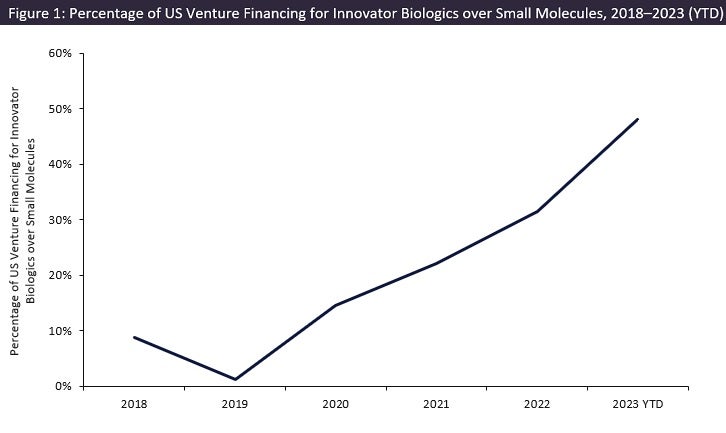US-headquartered biotechs received an overall of 19% ($7.6bn) more in venture financing for biologic innovator drugs over small molecule innovators drugs from 2018–2023 year to date (YTD), according to GlobalData’s Pharma Intelligence Center Deals Database. In August 2022, the US Congress passed the Inflation Reduction Act (IRA), which allows Medicare to negotiate lower prescription drug prices and limit price increases above inflation.
The IRA mandates a 13-year protection period for biologics before implementing price controls, while small molecules face price negotiations only after nine years of approval. This means that biologics will be less affected by the IRA compared to small molecule drug development, which in turn could impact decisions on biotech financing going forward.
At The Dawn of a New Biotech Era EndPoints BIO23 conference on 6 June 2023, biotech players discussed the current economic environment’s impact on dealmaking at a panel titled “How do you do a biotech deal- or keep on- in this economy?”
Figure 1 (above) includes all announced and completed deals from 2018 to 2023 that have a deal value disclosed. It includes venture financing deals for target companies located in the US with innovator biologic or small molecules drugs for all active development stages.
According to GlobalData’s Pharma Intelligence Center Deals Database, US-headquartered biotechs saw a peak of 48% ($1.05bn) more in innovator biologic drug venture financing over innovator small molecule drug venture financing in 2023 (Figure 1). Panelist Jeb Keiper, president and CEO of Nimbus Therapeutics, highlighted the need for “incentives to match” between biologics and small molecules, citing the negative effects of the IRA on small molecule companies such as Nimbus Therapeutics. Another constraint raised by Bain Capital Life Sciences partner and panellist Adam M Koppel was the substantial increase in capital costs, as “in the last 18 months, the cost of capital increased from 0.5% to 5.25%”, significantly affecting early-stage investments in the biotech industry and impacting both biotechs and investors.
Novartis chief strategy and growth officer and fellow panellist Ronny Gal emphasised that the company “adjusted all internal and external programmes to account for the impact of the IRA”. This resulted in increased collaborations between pharma and biotech, as evidenced by Takeda’s acquisition of Nimbus Lakshmi from Nimbus Therapeutics in February 2023. Similarly, Vertex entered a licensing agreement with CRISPR Therapeutics to accelerate the development of Vertex’s cell therapies for type 1 diabetes in March 2023. While there has been a noticeable shift in investments towards biologics and cell/gene therapies rather than small molecules, CRISPR Therapeutics CEO and panellist Samarth Kulkarni highlighted that the IRA “actually benefitted them with more inbounds from pharma”, hence enabling the development of drugs.

US Tariffs are shifting - will you react or anticipate?
Don’t let policy changes catch you off guard. Stay proactive with real-time data and expert analysis.
By GlobalDataThe IRA’s potential effects on innovation and drug pricing, in addition to other challenges such as loss of exclusivity for major products, have raised concerns in the biopharmaceutical industry. Recently, a lawsuit was filed by Merck and Bristol Myers Squibb against the Medicare price control bill to lower prescription drug costs. The IRA may impact revenues resulting in reduced investments in R&D, but further biopharmaceutical collaborations may help to support future innovation by mitigating costs as interest rates continue to rise.





